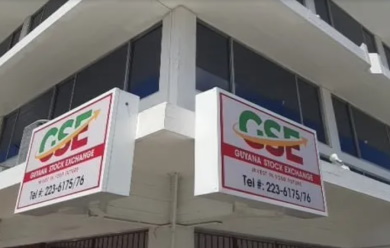GEORGETOWN, Guyana, Jan 30, CMC – The Georgetown Chamber of Commerce and Industry (GCCI) has expressed concerns at the operations of the Guyana Stock Exchange (GSE), saying it has been on public record, on multiple occasions, championing the reform of the capital markets in Guyana.
The GCCI said with access to financing being a leading hurdle for many businesses in Guyana, “GSE has a significant role to play in facilitating a transparent and efficient marketplace for companies to raise capital, invest, and grow.
“The lack of necessary infrastructure, technological advancements, and regulatory framework at the GSE compromises the financial health of businesses, restricts their ability to attract investment, and ultimately hampers their growth potential. That the substandard functioning GSE is also resulting in the sale of stocks in breach of a company’s by-laws is also most worrying,” the business group said.
It added that with Guyana being on a “revolutionary growth trajectory it is imperative that the GSE be rehabilitated to keep pace with the rapid growth and development taking place all across the nation.
“The GCCI therefore calls on the Guyana Association of Securities Companies and Intermediaries Inc., and Guyana Securities Council (GSC) to prioritise the modernization of GSE infrastructure, with a focus on the incorporation of technologically advanced best practices.”
The statement by the GCCI follows last weekend’s concerns raised at the Banks DIH Limited’s 68th annual general meeting regarding the way the shares of public companies here were being traded on the GSE.
“We are able to develop this company with all this capital works without borrowing and selling shares. That means the value of your shares will increase and that’s why we are concerned seriously about what is going at the Stock Exchange with the level on the value of our shares and we’ll have to take action now, now to solve this problem,” Banks DIH chairman and managing director, Clifford Reis told the meeting.
He made known the company’s position after a shareholder expressed satisfaction with his investment and planned to invest more but questioned why doesn’t the share price move in tandem with all the positive things that were happening.
The company announced that it has run out of space at Thirst Park and has purchased 40 acres of land for expansion of its operations, and would be purchasing a new bottling plant for US$71 million.
“Your company is so strong financially (that) we are not going to borrow money; we are not going to sell shares to put this plant into operation,” he said, describing as “amazing” the situation in Guyana where, for instance, last month 80,000 shares were sold between 25 persons, a number of whom had sold 1,000 shares without any hard financial evidence.
“I don’t know what is the concept behind it. It is not a financial concept; that I can tell you. It is not being sold because they look into the stock exchange, they look into the balance sheet and see what is there,” he said.
Reis recommended that the Guyana Securities Council (GSC) and the GSE establish an odd-lot market where less than 1,000 shares could be traded without affecting the overall share value of companies.
He recalled that last month a shareholder sold five shares out of 895 million shares and affected the Stock Exchange by GUY$20 (One Guyana dollar=US$0.004 cents). With the by-laws of the company stating that five shares cannot be transferred, he questioned how could the brokers have sold five shares to a person. T
In response to a question by another shareholder as to why the last trades on the GSE are “always the lowest” based on his constant review, Reis said that was because the Stock Exchange in Guyana publishes and takes into account all securities transaction.
“As a result of this practice, a small share transaction can significantly affect the share value of a particular share as is the case with all companies trading there,” he said, adding that the GSC and the GSE had been informed about that concern in the hope that it would fulfil its mandate of ensuring the the orderly growth and development of a capital market.
Additionally, Reis said Banks DIH has examined the Stock Exchange rules from other territories in the Caribbean and concluded that this issue may be solved by the implementation of an odd-lot market. He explained that the odd-lot market, like what obtains in Barbados, Jamaica, and Trinidad and Tobago, is a separate market where all transactions of may be less than a thousand shares or securities are handled depending on the total share capital of the company.
“Those transactions in this market do not affect the share price,” he added.






More Stories
Entrepreneurs urged to continually market themselves
More young people joining the BWU
Man dies following apparent hit-and-run